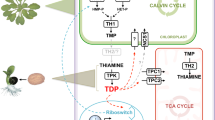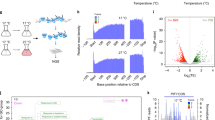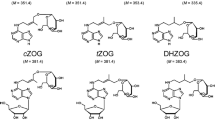Abstract
THE change from dormancy to germination of seeds requires water and an appropriate temperature. Wheat embryo germination is characterised by an initial increase in fresh weight, followed by a 5-h lag1. Although RNA synthesis is one of the earliest biologically measurable activities in wheat embryo germination2,3, its mode of regulation has not been established. Reports3–6 have suggested that the rate of synthesis does not change during the first 6 h of germination. But no adjustment was made for the specific activities of ribonucleoside triphosphate, UTP. This would have led to a misinterpretation of incorporation data when there was either a change in the concentration of the nucleotide or a difference in the rate of phosphorylation from nucleoside to nucleotide as germination progressed. To investigate further whether there is a change in the rate of RNA synthesis in the germination phase, we have used recentlydeveloped enzyme assays7–9 to measure picomole changes in purine pyrimidine ribonucleotide levels. We found a threefold increase in the rate of RNA synthesis of wheat embryos germinated for 40 min–5.5 h. We used the reaction catalysed by uridine 5′-diphosphoglucose pyrophosphorylase to determine the content of UTP. The key step in this analysis is the selective adsorption of the reaction product, UDP-14C-glucose, on to activated charcoal in the presence of 0.8 M Trizma base9.
This is a preview of subscription content, access via your institution
Access options
Subscribe to this journal
Receive 51 print issues and online access
$199.00 per year
only $3.90 per issue
Buy this article
- Purchase on Springer Link
- Instant access to full article PDF
Prices may be subject to local taxes which are calculated during checkout
Similar content being viewed by others
References
Marcus, A., Feeley, J. & Volcani, T. Plant Physiol. 41, 1167–1172 (1966).
Spiegel, A. & Marcus, A. Nature 256, 228–230 (1975).
Dobranska, M., Tomaszewski, M., Grzelczak, Z., Rejman, E. & Buchowicz, J. Nature 244, 507–509 (1973).
Spiegel, S., Obendorf, R. & Marcus, A. Plant Physiol., 56, 502–507 (1975).
Chen, D., Schultz, G. & Katchalski, E. Nature new Biol. 231, 69–72 (1971).
Chen, D. & Osborne, D. Nature 226, 1157–1160 (1970).
Cheung, C. P. & Marcus, A. Analyt. Biochem. 69, 131–139 (1975).
Cheung, C. P. & Marcus, A. FEBS Lett. 70, 141–144 (1976).
Cheung, C. P. & Suhadolnik, R. J. Analyt. Biochem. 83, 52–56 (1977).
Marcus, A. Symp. Soc. exp. Biol. 23, 143–160 (1969).
Mazus, G. & Brodniewiecz-Proba, T. Acta biochim. Pol. 23, 261–267 (1976).
Yoshida, K. & Sasaki, K. Plant Physiol. 59, 497–501 (1977).
Maxson, R. E., Jr & Wu, R. S. Eur. J. Biochem. 62, 551–554 (1976).
Jamieson, A. T. & Webb, D. R. Analyt. Biochem. 72, 212–219 (1976).
Hentschel, C. & Tata, J. Devl Biol. 57, 293–304 (1977).
Keppler, D. Cancer Res. 37, 911–917 (1977).
Author information
Authors and Affiliations
Rights and permissions
About this article
Cite this article
CHEUNG, C., SUHADOLNIK, R. Regulation of RNA synthesis in early germination of isolated wheat (Triticum aestivum L) embryo. Nature 271, 357–358 (1978). https://doi.org/10.1038/271357a0
Received:
Accepted:
Published:
Issue Date:
DOI: https://doi.org/10.1038/271357a0
This article is cited by
Comments
By submitting a comment you agree to abide by our Terms and Community Guidelines. If you find something abusive or that does not comply with our terms or guidelines please flag it as inappropriate.



